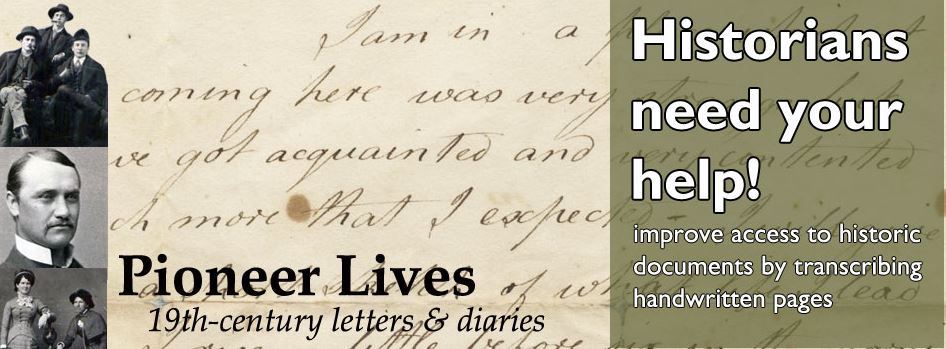This November, as Thanksgiving brings thoughts of pilgrims, the University of Iowa Libraries is exploring a later period of American history with a new digital collection, crowdsourcing initiative, and curriculum project based on pioneer-era documents.
Featuring more than 2,500 pages of letters, diaries, and photographs dating from the mid-to-late 19th century, the Pioneer Lives collection is available for browsing at the Iowa Digital Library: digital.lib.uiowa.edu/pioneers
The documents have also been added to DIY History — diyhistory.lib.uiowa.edu— the Libraries’ crowdsourcing site, where the public can help with historical research by providing transcriptions for handwritten texts. Earlier this fall, the collection got a test run from rhetoric students participating in a curriculum pilot project developed by IDEAL (Iowa Digital Engagement & Learning) to incorporate digital humanities in the undergraduate classroom.
Documenting Iowa’s early settlers, the Pioneer Lives collection lends immediacy to this historic period through the first-hand accounts of ordinary citizens. This is particularly true of the correspondence, with its descriptions of new lives written for loved ones left behind:
“Dear Father, I am in a place which at my coming here was very strange, but I have got acquainted and very contented, much more than I expected. I will give you a short sketch of what life I live here…” – Henry Eno letter, 1813
“My Dear Cousin, I thought I would write to you as it is my birthday. I am 11 years old… I go to school now… We have three boarders. I am going to learn to scate [sic] this winter…” – Emma Ward letter, 1866
“Dear Brother McCormick, Yours received, some time since, asking a sketch of my career as an M.D. during the past year, which… I must admit has far exceeded my hopes…” – Dr. Mila Sharp letter, 1885
Students in honors Rhetoric taught by Tom Keegan, faculty member and co-director of IDEAL, explored the collection during a four-week assignment that involved transcribing historic correspondence, conducting background research with primary source materials, performing rhetorical analyses of the documents, and presenting findings via screencast videos uploaded to YouTube.
In addition to learning new skills and information, many of the students enjoyed themselves along the way.
“I had a fun time analyzing my document which is rare because homework is almost never fun for me,” wrote one student in a class blog post. “I thought this was one of the first projects that I actually felt like I was making a legitimate discovery and that was a really unique experience.”

I am a writing and rhetoric teacher, and I think this sounds like a great idea; I’d love to do something like this in my classroom! I’d love to hear if anyone has ideas on how to modify this project for a first-year writing course.